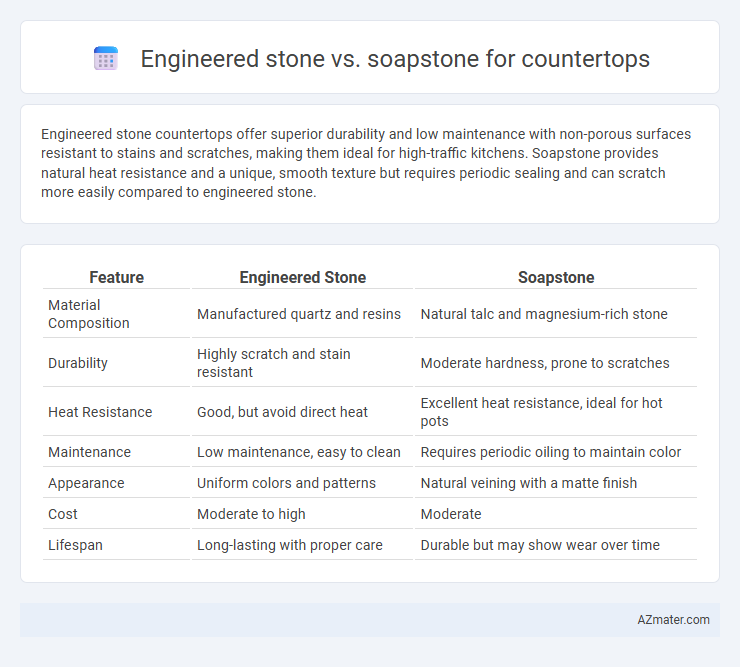Engineered stone countertops offer superior durability and low maintenance with non-porous surfaces resistant to stains and scratches, making them ideal for high-traffic kitchens. Soapstone provides natural heat resistance and a unique, smooth texture but requires periodic sealing and can scratch more easily compared to engineered stone.
Table of Comparison
| Feature | Engineered Stone | Soapstone |
|---|---|---|
| Material Composition | Manufactured quartz and resins | Natural talc and magnesium-rich stone |
| Durability | Highly scratch and stain resistant | Moderate hardness, prone to scratches |
| Heat Resistance | Good, but avoid direct heat | Excellent heat resistance, ideal for hot pots |
| Maintenance | Low maintenance, easy to clean | Requires periodic oiling to maintain color |
| Appearance | Uniform colors and patterns | Natural veining with a matte finish |
| Cost | Moderate to high | Moderate |
| Lifespan | Long-lasting with proper care | Durable but may show wear over time |
Introduction to Engineered Stone and Soapstone Countertops
Engineered stone countertops consist of crushed quartz mixed with resin and pigments, offering high durability, stain resistance, and a wide range of colors and patterns. Soapstone countertops, made from natural talc-rich rock, provide a smooth, matte finish with excellent heat resistance and a unique, tactile feel that darkens over time. Both materials are popular in kitchen design, balancing aesthetics with functional benefits specific to their composition.
Composition and Material Differences
Engineered stone countertops consist of approximately 90% crushed quartz combined with resin and pigments, offering uniformity and enhanced durability. Soapstone is a natural metamorphic rock composed primarily of talc, magnesium, and chlorite, known for its heat resistance and soft, smooth texture. The engineered quartz provides greater stain resistance and hardness compared to the more porous and softer soapstone surface.
Aesthetic Options and Visual Appeal
Engineered stone countertops offer a wide range of aesthetic options with consistent patterns, vibrant colors, and polished finishes that mimic natural stone, providing a sleek and modern visual appeal. Soapstone features a unique, matte surface with subtle veining and natural color variations ranging from gray to black, creating a warm, rustic charm that develops a patina over time. Both materials deliver distinct visual character, with engineered stone ideal for contemporary designs and soapstone favored for classic, timeless elegance.
Durability and Strength Comparison
Engineered stone countertops offer superior durability with high resistance to scratches, stains, and heat due to their composite materials of quartz and resin. Soapstone, while softer and more prone to scratches and dents, boasts excellent heat resistance and can be easily repaired or refinished over time. Engineered stone generally provides greater strength and longevity for heavy-use kitchen environments compared to the more delicate nature of soapstone.
Resistance to Stains and Scratches
Engineered stone countertops, composed primarily of quartz, offer superior resistance to stains and scratches due to their non-porous surface and durable resin binders. Soapstone, a natural material, is more prone to scratches and can absorb oils and stains over time but can be resurfaced and treated with mineral oil to improve its appearance and resistance. Choosing engineered stone provides a low-maintenance option with high durability, while soapstone requires more regular care to maintain its aesthetic and protective qualities.
Maintenance and Cleaning Requirements
Engineered stone countertops require minimal maintenance, featuring non-porous surfaces that resist staining and bacterial growth, making regular cleaning with mild soap and water sufficient. Soapstone, while naturally resistant to heat and stains, is porous and may need periodic sealing and mineral oil treatments to maintain its appearance and prevent surface oxidation. Both materials offer durability, but engineered stone offers lower long-term upkeep efforts compared to the more hands-on care soapstone demands.
Heat and Chemical Resistance
Engineered stone offers superior heat resistance withstanding temperatures up to 150degC, making it highly durable against hot cookware. Soapstone features exceptional chemical resistance due to its non-porous nature, preventing staining and damage from acids and household cleaners. Both materials provide reliable performance for countertops, but engineered stone excels in heat endurance while soapstone is preferred for resisting chemical exposure.
Environmental Impact and Sustainability
Engineered stone countertops typically consist of 90-95% crushed quartz combined with resins and pigments, leading to concerns over non-biodegradable synthetic components and energy-intensive manufacturing processes. Soapstone, a natural metamorphic rock primarily composed of talc, garners praise for its durability, minimal processing, and ability to be quarried with less environmental disruption. From a sustainability perspective, soapstone offers a more eco-friendly option with lower embodied energy and the potential for repurposing, whereas engineered stone's reliance on petrochemical resins and higher carbon footprint pose greater environmental challenges.
Cost and Value Considerations
Engineered stone countertops typically cost between $50 and $100 per square foot, offering superior durability and a wide range of design options that enhance long-term value. Soapstone, priced around $70 to $120 per square foot, provides natural heat resistance and a unique, rustic aesthetic but requires regular maintenance to prevent staining and wear. Choosing between engineered stone and soapstone depends on balancing initial cost with desired durability, maintenance, and aesthetic preferences for maximizing countertop value.
Choosing the Best Countertop for Your Needs
Engineered stone countertops offer exceptional durability, stain resistance, and a wide range of colors and patterns, making them ideal for high-traffic kitchens. Soapstone, known for its natural heat resistance, unique veining, and ease of repair, suits homeowners seeking a softer, more rustic aesthetic with low maintenance. Selecting the best countertop depends on your priorities such as durability, appearance, and maintenance preferences, ensuring a balance between functionality and style.

Infographic: Engineered stone vs Soapstone for Countertop
 azmater.com
azmater.com